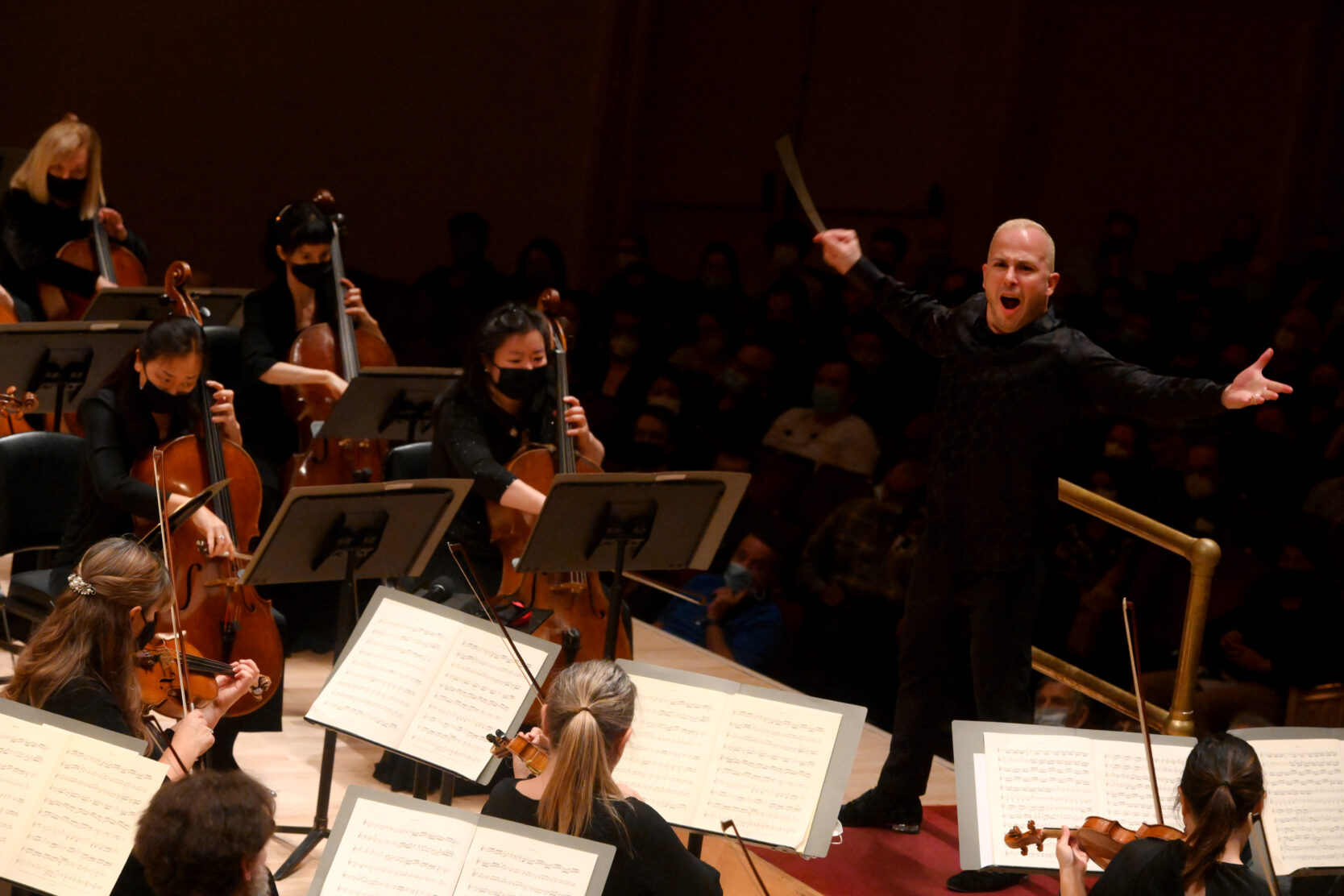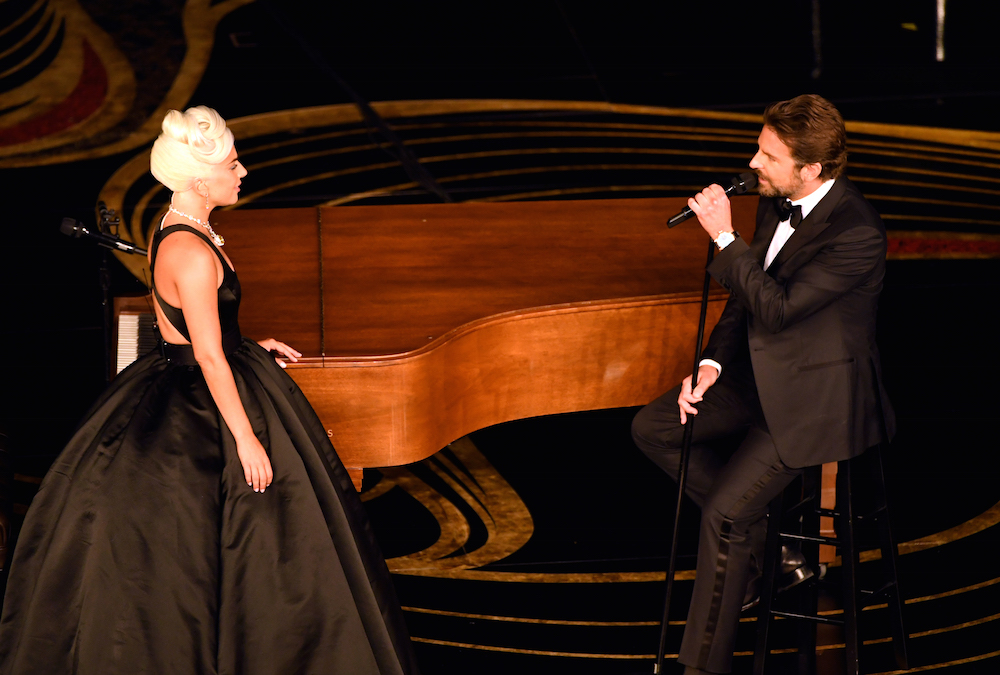In Maestro, director, actor, and co-screenwriter Bradley Cooper’s magnetic new film, the multi-hyphenate tackles the topic of Leonard Bernstein with the same zeal the late composer-conductor put into his work and life.
Aiding Cooper in his Maestro-mission is Yannick Nézet-Séguin, a conductor fond of recounting this favorite Leonard Bernstein quote. “I need to conduct with every part of my body, with my shoulders, with my wrists, with my knees,”
Nézet-Séguin, the unconventional conductor-musical director of New York’s Metropolitan Opera, the Philadelphia Orchestra, and Montréal’s Orchestre Métropolitain is, according to 60 Minutes, “Obliterating the stereotype of the strict unapproachable maestro, joyfully keeping his musicians in time, his hair bleached platinum blonde with a smile all-but-welded to his face. Known as much for his versatility as he is his virtuosity, Nezet-Seguin is reimagining the role of the modern orchestra.”
His wild conducting style is passionate and highly energetic, and his seasonal programming jumps across all musical genres.
Living and creating without boundaries, Bernstein, who died in 1990 at the age of 72, was a genre-jumping classicist who composed jazzy film scores (On the Waterfront), theatrical musicals (On the Town) and, most famously, the street-symphonic West Side Story with Stephen Sondheim. Bernstein brought rock’s edginess to his epic MASS composition, introduced the masses to classical music via regularly televised Young People’s Concerts with the New York Philharmonic, and revived composer Gustav Mahler’s tense romanticism in America (Cooper’s recreation of Mahler’s Symphony No. 2 in C Minor “Resurrection” is Maestro’s centerpiece, a marvel of sight and sound). When conducting, Bernstein was a whirling dervish of flailing arms and flashing teeth. When he married actress Felicia Montealegre and had children, Bernstein still conducted sexual affairs with men as his passions were as immense and insatiable as his restless musicality.
“Bernstein expressed everything he felt about the music at the podium without apology,” says Nézet-Séguin, conductor-musical director of New York’s Metropolitan Opera, the Philadelphia Orchestra, and Montréal’s Orchestre Métropolitain. “That lack of inhibition is true authenticity. We work all our lives to be that true to ourselves, but Lenny is the master, inspiring me every day.”
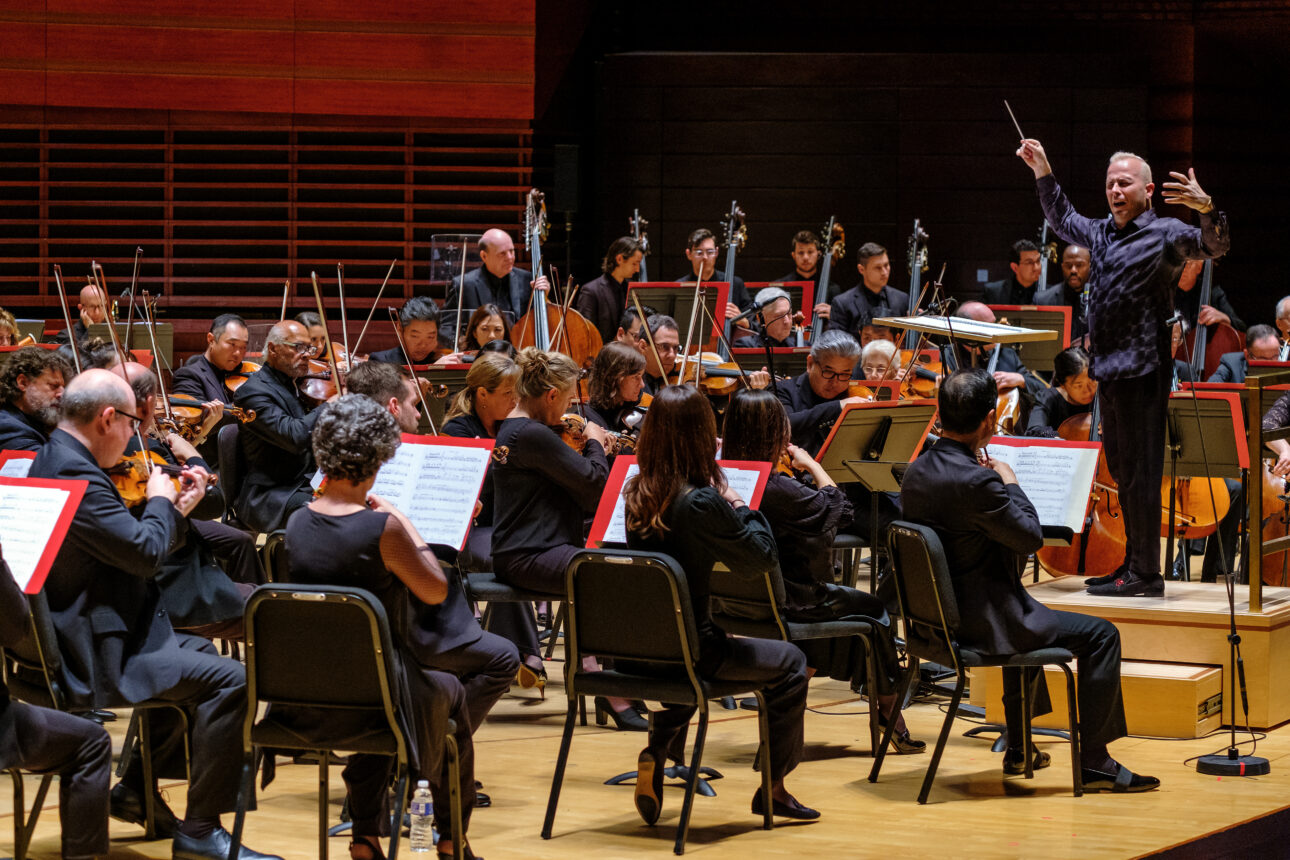
Along with acting as Cooper’s coach in Maestro, Nézet-Séguin put the London Symphony Orchestra through the paces of Bernstein on its soundtrack. Cooper may bounce off walls during the reenactment of Mahler’s “Resurrection,” but it’s Nézet-Séguin’s guiding hand and spirited interpretation that gives Maestro its verity and lusty cinematic thrill.
Dealing with the passion of the artist through the complexity of the man, Cooper inhabits Bernstein and Maestro’s compositions with Nézet-Séguin as his cicerone.
Like Maestro Cooper, Nézet-Séguin lost himself within the music of the film and the power of the art form while channeling Bernstein. “Getting inside a towering figure as Bernstein required total immersion,” said the conductor of the actor, as well as his own process.
More importantly, like Bernstein – modern classical music’s rebel – Nézet-Séguin has never fit the typical classical conductor-music director model.
Being gay as a conductor is not rare. Being gay, having platinum-dyed hair and eschewing the podium’s uniform of tails-and-tie is bold.
“As long as I’ve done this for a living, I never tried to be provocative,” says Nézet-Séguin. “Accepting yourself gets musicians to trust you. Audiences too.”
Along with conducting orchestras with his wild physicality of thrusting arms, exaggerated expressions and fleet, flying fingers, Nézet-Séguin is behind the recent resurgence of the Metropolitan Opera, a company that, before him, was populated by a repetitive roster of the usuals of operatic programming. Rather than play to tradition, Nézet-Séguin regularly commissions new operas from new composers, works based on books, films, and real-life stories like Champion, (about African-American bisexual boxer Emile Griffith). While some Met subscribers complain about his incendiary new music, Nézet-Séguin programs what he believes “advances the form and keeps opera’s storytelling tradition alive.”
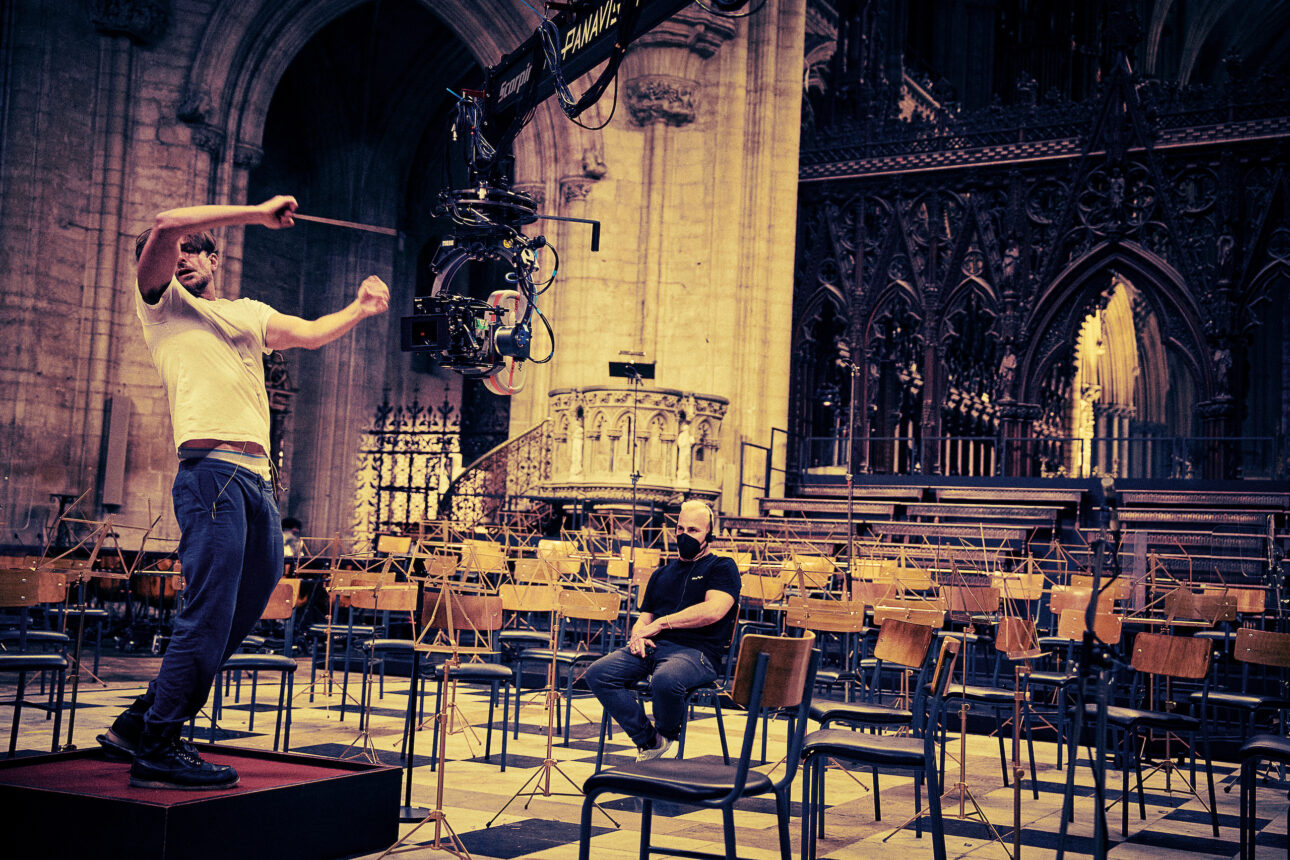
With energy and diversity as his guiding principles, Nézet-Séguin is Bernstein reborn.
“He gets it,” says jazz trumpeter Terrence Blanchard told CBS correspondent Jon Wertheim on 60 Minutes. “Yannick gets the story. He gets the whole notion of bringing different styles of music together. During one rehearsal (for Fire Shut Up in My Bones) he told the orchestra, ‘Don’t follow me. Follow the drums.’ Most conductors don’t do that.”
Brian Sanders, choreographer of the experimental movement troupe, JUNK, worked closely with Nezet-Seguin on several staged productions. “One thing became clear working with Yannick and the Philadelphia Orchestra as well as enjoying his conducting at the Met,” noted Sanders. “There is an energy and exactness to Yannick’s movement and direction that I believe is key to his excellence — the dance as it were. But that physicality and clarity is not for us, the audience. His passion emanates out through him to the artists, and, in turn, is projected back to us, amplified.”
“I’m blushing,” said Nézet-Séguin with a laugh when called out for the unique fashion in which he conducts himself as a conductor, programs orchestral seasons, and his spiritual-aesthetic connection to Bernstein.
“I’m conducting my life in music as one that builds bridges, dialoguing different flavors of music together.”
A gifted pianist at age 5, by 10, Nézet-Séguin was waving pencils about in his parents’ Montreal basement to mimic conducting.
“It was clear to me, then, that I wanted to conduct, yet the reasoning why, initially, was not clear,” he said with a laugh. “I could only think of it as a calling. My path…”
So, like Bernstein, Nézet-Séguin felt that music’s greatest connection came through communion – an interdependence shared via his leadership roles in New York, Philadelphia and Montréal’s Orchestre Métropolitain (where his partner, Pierre Tourville, plays as a violist), as well as Rotterdam Philharmonic and the Sarasota Opera where he made his American conduction debut in 2002.
“I couldn’t articulate this when I first became interested in conducting… but I felt the power of making music collectively. Spiritually and aesthetically, though I’m only 48, I’m starting to become really experienced…. Now, I can reach greater symbiosis with the emotional aspect of a piece. I want to be less and less in control and more and more in its abandon.”
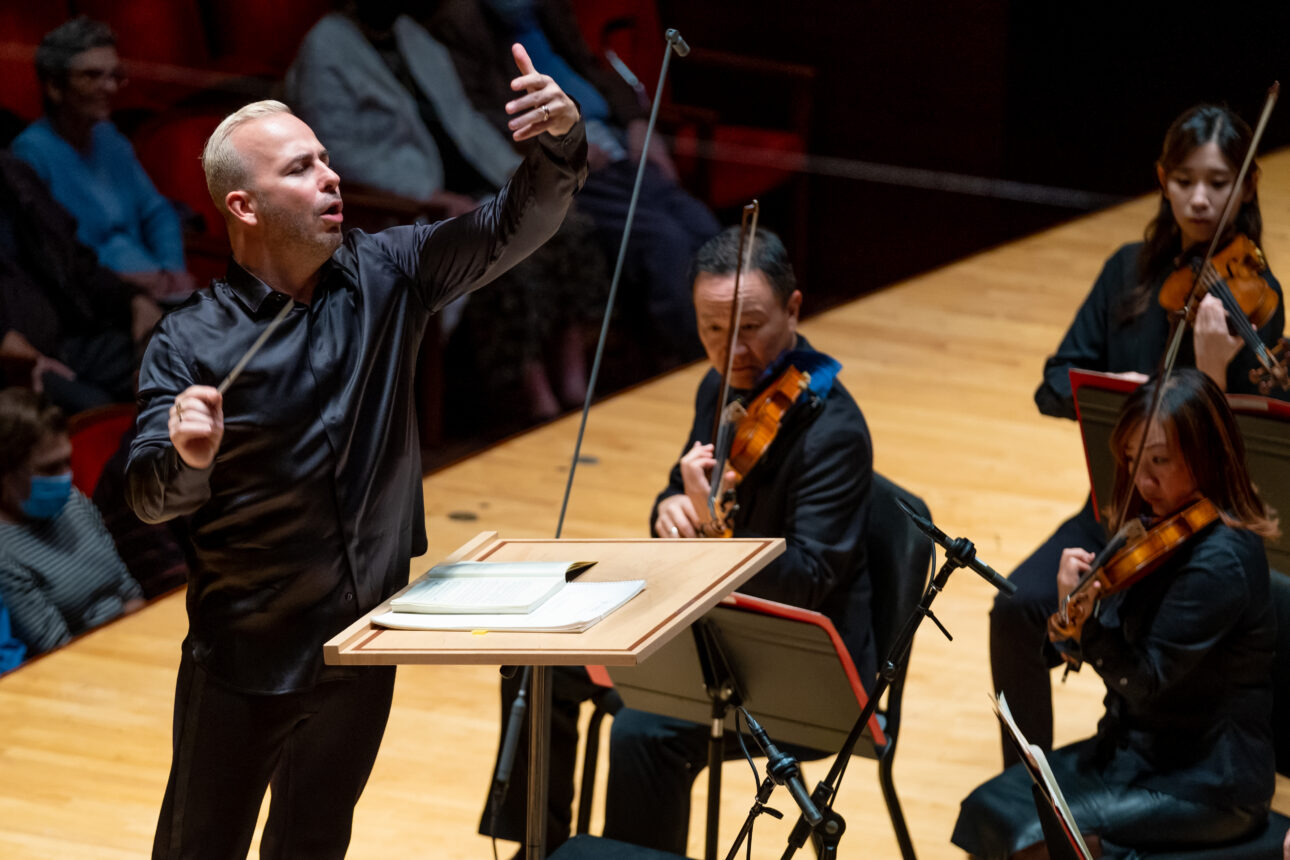
Sharing an age with Cooper, proximity to “that Philly thing” (the actor’s hometown), and the “beautiful challenge” of maintaining “cool, crystal-clear minds” in their work, Nézet-Séguin got the Maestro coach gig while the former was deep in Bernstein research mode.
“We clicked,” he said. “I represented the perspective of explaining what made Bernstein unique, had similar physical approaches to the podium, and both Bradley and I wanted every detail to matter so he could fully become Lenny. I needed to teach Bradley the technicality of it. Lenny might seem free, but there’s a downbeat that’s down, and an upbeat that’s up.”
To get that mix of precision and surrender, Nézet-Séguin was often, literally, in Cooper’s ear during filming with a custom earpiece that allowed for fast communication between actor-director and his conductor nearby.
“I could become another part of Bradley’s brain so to subconsciously stay on track with the right moves while he focused on Bernstein’s complete abandon,” said Nézet-Séguin of his own push to help Cooper attain pure Lenny-dom. “Look, that code – mixing the free with the technical – is hard to get within classical music. But Bradley was there for it. Me too.”

